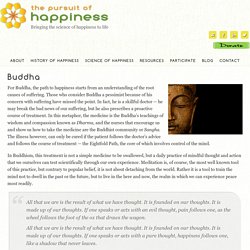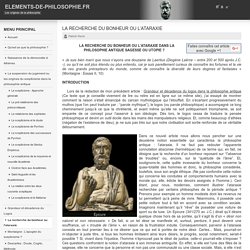

La recherche du bonheur - Philisto. Visualisations : 54951Modifié : 26/09/2009 à 13h34 Le premier philosophe a avoir pointé le caractère universel du désir du bonheur est Aristote.

Tout le monde veut être heureux, observe-t'il, mais les hommes divergent sur les moyens d'y parvenir. Le bonheur, remarque-t'il, est la seule chose que nous désirons pour elle-même: ainsi ce n'est pas la richesse en elle-même que nous désirons, c'est le bonheur qui pourrait en résulter, de même pour la gloire ou le pouvoir. Dans ce document seront examinées successivement les deux principales philosophies eudémonistes de l'Antiquité (l'épurisme et le stoïcisme) et deux critiques de la recherche du bonheur. L'épicurisme: une morale hédoniste Les fondements de la morale épicurienne Dès leur naissance, les Hommes recherchent spontanément le plaisir et fuient le malheur. Les dieux ne sont pas à craindre.La mort n'est pas à craindre.Le bonheur est facile à atteindre.La douleur est facile à endurer. La philosophie épicurienne est un matérialisme. Buddha and Happiness.
For Buddha, the path to happiness starts from an understanding of the root causes of suffering.

Those who consider Buddha a pessimist because of his concern with suffering have missed the point. In fact, he is a skillful doctor — he may break the bad news of our suffering, but he also prescribes a proactive course of treatment. In this metaphor, the medicine is the Buddha’s teachings of wisdom and compassion known as Dharma, and the nurses that encourage us and show us how to take the medicine are the Buddhist community or Sangha.
The illness however, can only be cured if the patient follows the doctor’s advice and follows the course of treatment — the Eightfold Path, the core of which involves control of the mind. In Buddhism, this treatment is not a simple medicine to be swallowed, but a daily practice of mindful thought and action that we ourselves can test scientifically through our own experience. All that we are is the result of what we have thought. Buddhism & Happiness. The Buddha's Path to Happiness - An Introduction. By Barbara O'Brien Updated June 02, 2015.

The Buddha taught that happiness is one of the Seven Factors of Enlightenment. But what is happiness? Dictionaries say happiness is a range of emotions, from contentment to joy. We might think of happiness as an ephemeral thing that floats in and out of our lives, or as our life's essential goal, or as just the opposite of "sadness. " One word for "happiness" from the early Pali texts is piti, which is a deep tranquility or rapture. Four Noble Truths of Buddhism (What Are They?) By Barbara O'Brien Updated March 31, 2015.

The Buddha's first sermon after his Enlightenment centered on the Four Noble Truths, which are the foundation of Buddhism. The truths are: The truth of suffering (dukkha)The truth of the cause of suffering (samudaya)The truth of the end of suffering (nirhodha)The truth of the path that frees us from suffering (magga) Let's look at one truth at a time. Buddhist Concept of Happiness. Happiness in Pali is called Sukha, which is used both as a noun meaning “happiness,” “ease,” “bliss,” or “pleasure,” and as an adjective meaning “blissful” or “pleasant.”

To understand precisely the nature of happiness, a brief discussion of the Buddhist analysis of feeling is necessary. Feeling (vedana) is a mental factor present in all types of consciousness, a universal concomitant of experience. It has the characteristic of being felt, the function of experiencing, and as manifestation the gratification of the mental factors. It is invariably said to be born of contact (phassa), which is the coming together (sangati) of a sense object, a sense faculty, and the appropriate type of consciousness. When these three coalesce consciousness makes contact with the object. LA RECHERCHE DU BONHEUR OU L’ATARAXIE. « Je suis bien marri que nous n’ayons une douzaine de Laertius (Diogène Laërce – entre 200 et 500 après J.C. -), ou qu’il ne soit plus étendu ou plus entendu, car je suis pareillement curieux de connaître les fortunes et la vie de ces grands précepteurs du monde, comme de connaître la diversité de leurs dogmes et fantaisies » (Montaigne : Essais II, 10) Lors de la rédaction de mon précédent article : Grandeur et décadence du logos dans la philosophie antique (Ce texte que je conseille vivement de lire ou relire est en ligne sur ce même site), j’ai essayé de montrer comment la raison s’était émancipé du carcan mythologique qui l’étouffait.

En s’écartant progressivement du muthos (que l’on peut traduire par : “parole mythique”), le logos (ou parole philosophique) a accompagné ce long cheminement jusqu’à ce que la chrétienté, et avant même qu’elle ne soit politiquement triomphante, se soit emparée de ce concept pour l’asservir à son idéologie. Épicure C’est à la fin du 4ème siècle av. J.C.